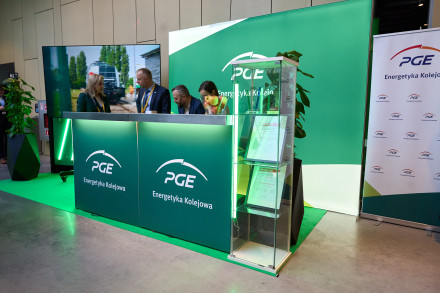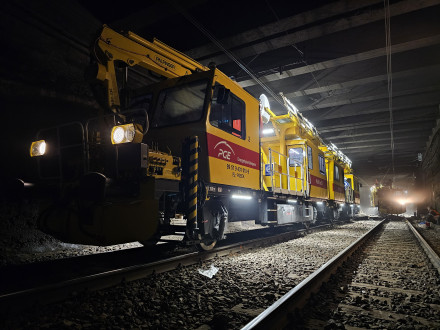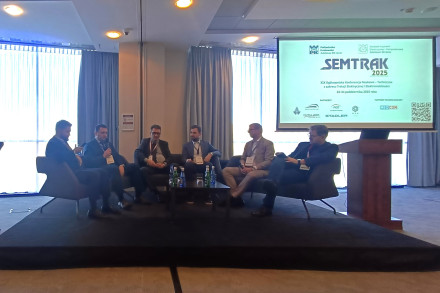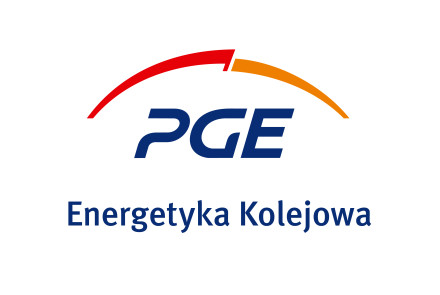PKP Energetics services are battling the elements
18.12.2025, 8min read
The weekend of February 18-20 saw the restoration of power supply to railroads after strong winds blew intensely across Poland. Our reliable brigades and dispatching services worked on almost 400 incidents (4,000 breakdowns) across Poland! This is several times more than on an ordinary weekend. Below is a day-by-day report.
Friday 18.02.
After Hurricane Nadia (29-31.01) and stronger than usual wind gusts across the country, our services are preparing for Hurricane Eunice. The end of January and the beginning of February saw the restoration of power to railroads in more than 120 locations across the country. At the most difficult time, our brigades worked to clear the consequences of 51 emergency incidents on overhead lines and 68 on non-traction needs lines, involving 511 direct employees on 32 network trains.
On Friday, we concentrated on restoring the network to its original state, scheduled work has been halted. According to weather forecasts, wind speeds in the coming days are predicted to be 100 km/h, with gusts of up to 180 km/h across the country. Hence the increased vigilance and full readiness of all our units and systems, including:
- Readiness of all network trains for departure
- strengthened dispatching staff
- Establishment of a 24/7 crisis staff
- Launching instant scheduling and emergency reporting and
- Additional IT support in case of communications failure and Elester PKP support in case of remote control failure
- Constant contact with PKP Polskie Linie Kolejowe S.A. and other services


Saturday 19.02
The Eunice storm is hitting hardest in the west of the country, where it is tearing down overhead catenary, toppling trees and damaging power equipment. The storm is covering more areas of the country. Our brigades are moving as needed to intervene, with the most difficult tasks occurring on lines 273 and 354.
LK 273 (Nadodrzanka) - in many places, including Widuchowa, Chojna, Kostrzyn, Kowalow, Drzeńsko, Zielona Góra, Boreczek, Brzeg Dolny - requires the intervention of three network trains and additional equipment (including a rail-road vehicle). Intensive work has been going on since Friday evening.
LK 354, on the route Piła-Poznan - among other things, in several places there is damage to the network on a section of almost 1.5 km Throughout Saturday, three network trains (directed from Poznan, Gniezno and Krzyzno) and a supporting draisine are working in removing the failure on this line.
On Saturday, the number of interventions reaches 350, which is several times more than on a normal weekend. Two, three or even four trains, including special units, leave for some incidents. At the end of the day, most of the urgent incidents are cleared and rail traffic is restored. Brigades are still operating at about 100 sites. Full readiness and mobilization is being maintained as the weather continues to be unstable and winds continue to damage rail and distribution infrastructure facilities.

Sunday 20.02
The force of the elements is receding, but numerous smaller faults are being identified throughout the country. PKP Energetics brigades are still battling complex faults on lines including: LK273, LK 274, LK354 and LK281


Monday 21.02
Summary time. On February 18-20, there were almost 400 incidents, most of a complex nature - on average there were about 10 failures per incident, so we should be talking about about about 4,000 faults on the network nationwide. Eliminating the consequences of failures and restoring infrastructure elements after damage is the priority that PKP Energetyka will be dealing with in the coming days. At the same time, the company is maintaining readiness in case of further weather difficulties.
In the fight against the elements:
- 70 dispatchers worked (on regular days it's 26 people)
- 1,300 field employees of PKP Energetyka took part in the actions (700 electricians of network trains and 600 people in the power standby)
- 55 trains worked on breakdowns
- A total of 24,000 kilometers were driven on the way to failure
- 250 liters of coffee was drunk
„NI don't remember such a scale of destruction. I could compare it to Orkan Ksawery in 2017. With that one, the element was limited to the western and southern parts of the country. This weekend, on their way to an emergency, our brigades had to remove trees fallen on tracks or power lines every few hundred meters. Fight strong gusts of wind and breakdowns covering up to more than 1,000 meters of lines and several substations at once. This time, however, we were much better prepared - the integration of management and systems such as SCADA, Planer or PKPE24 allowed us to fight the elements more efficiently and safely, " says Marcin Bielas, director of the Network Traffic Management Department of PKP Energetyka .
„Every moment of the day and night we could count on each other. The situation was particularly difficult at the Western Plant. The directors personally supervised the situation, for which I thank them again. The sum of failures exceeded all our predictions, and I will say frankly I do not remember such a situation from the past, and I have lived through a little. I am glad that the cooperation with PKP Polskie Linie Kolejowe was smooth and effective. For which I thank the railroad infrastructure manager very much. Thanks are also due to all employees involved in the smooth resolution of emergency incidents. Section managers, together with their teams, sometimes worked in very extreme conditions, bearing in mind that safety is paramount, " says Zbigniew Jastrzębski, director of the PKP Energetyka Services Branch.
Thank you to all the employees of PKP Energetics for their hard and efficient work!






